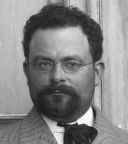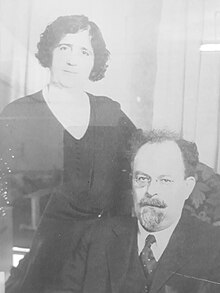Abraham Zevi Idelsohn
This article includes a list of general references, but it lacks sufficient corresponding inline citations. (May 2022) |
Abraham Zevi Idelsohn | |
|---|---|
אַבְרָהָם צְבִי אידלסון | |
 Idelsohn in 1912 | |
| Born | 11 June 1882 |
| Died | 14 August 1938 (aged 56) |
| Citizenship | South African |
| Occupation(s) | ethnomusicologist, composer |
| Spouse | Tzilla Idelsohn |
| Relatives | Joel Goodman Joffe (maternal grandson) |
Abraham Zevi Idelsohn (Hebrew: אַבְרָהָם צְבִי אידלסון Avrohom Tzvi Idelsohn in Ashkenazi Hebrew; middle name also rendered Tzvi, Zvi, Zwi, or Zebi; June 11, 1882[1] – August 14, 1938) was a prominent Jewish ethnomusicologist and composer, who conducted several comprehensive studies of Jewish music around the world.
Early life
[edit]
Idelsohn was born on 11 June 1882 to Jewish parents in Feliksberg, a fisher hamlet in present-day Ventspils, Latvia (then part of the Russian Empire). His father was a Shochet and Baal-t’filloth (Master of Prayer) in their district. When Idelsohn was less than six months old, the family moved to Libau (now Liepāja). There, due to the efforts of Philip Klein, Idelsohn's father was appointed overseer of kosher meat in a non-Jewish butchery. The young Idelsohn used to go with his father to a nearby choir school led by Abraham Mordecai Rabinovitz, who later became teacher to Idelsohn.[2]
Idelsohn learnt the synagogal modes and “Zemiroth” as well as Jewish folk-songs from his father. At home, he received an orthodox education and "appreciation for everything Jewish". At the age of 12, he was sent to Lithuanian jeshivas, where he remained five years. Upon hsi return home, he decided to take an examination at the Gymnasium and prepare for "an intelligent profession". He secured a tutor and started studying.[2]
Career
[edit]
He began his study of Jewish music in Libau, and was trained to be a Hazzan (cantor). He worked briefly in Imperial Germany and the Union of South Africa. In 1905, he emigrated to the Mutasarrifate of Jerusalem (part of historic Palestine under the Ottoman Empire) and established a school of Jewish music there in 1919.
In 1922 he moved to Cincinnati, Ohio, USA to take a position as professor of Jewish music at Hebrew Union College. In September 1929, he visited his family in Johannesburg (then in the Union of South Africa) for his parents’ golden wedding anniversary. During his time there, he gave talks on Jewish music as well as the nature, principles and procedures of Progressive Judaism. He urged his brother, Jerry, to establish a group to initiate Progressive Judaism in Johannesburg. In June 1931, the South African Jewish Religious Union for Liberal Judaism was established with Jerry as honorary secretary, and a wide media campaign was launched. Eventually, the South African Progressive Judaism.[3][4] came into being.
He is also famous for being the first researcher to document the folk music of Syrian Jews.[5]
Idelsohn is generally acknowledged as the “father” of modern Jewish musicology, despite his publishing starting after that of Angie Irma Cohon. During his time in Jerusalem, he noted a great diversity of musical traditions among the Jews living in the region. Idelsohn examined these traditional melodies and found recurring motifs and progressions that were not found in any other national music. This suggested a common origin for musical phrases that went back to Israel/Palestine in the first century CE. He found that these motifs fell into three distinct tonal centers, which corresponded to the Dorian, Phrygian, and Lydian modes of the ancient Greeks. Each of these modes elicited a distinct psycho-emotional response. The Dorian Mode was used for texts of an elevated and inspired nature; the Phrygian for sentimental texts, with their very human outbreaks of feeling, both of joy and grief; and the Lydian was used in composing music for the texts of lamenting and confessions of sins. Idelsohn further categorized and defined these motives as ones that either prepared a musical phrase, began it, or concluded it.[6]
He was also the music teacher to Moshe Nathanson, a well-known Jewish composer who is known to be the author of the lyrics to the famous Jewish folk song "Hava Nagila."[7][8]
Works
[edit]His works include the monumental Thesaurus of Hebrew Oriental Melodies (10 volumes, 1914–1932), Jewish Music (1929), and a collaboration with Cohon on Harvest Festivals, A Children’s Succoth Celebration.[9]
Death
[edit]Idelsohn died in Johannesburg on 14 August 1938, at the age of 56.
Descendents
[edit]Idelsohn's maternal grandson was Joel Goodman Joffe (Baron Joffe) (1932-2017).[8][10]
| Part of a series on |
| Anthropology |
|---|
 |
References
[edit]- ^ Contradicting information about his date of birth can be found in various works of reference: the German Encyclopaedia judaica (1931) mentions June 14, 1882; Riemann Musiklexikon (1959) July 14, 1882, Baker's Biographical Dictionary of Musicians (2001) July 13, 1882. Idelsohn himself in the Hebrew version of his autobiographical sketch mentions the correct date as 24 Sivan 5682 (= June 11, 1882) and notes, that the birth was registered in official documents on July 1, 1882. see: Israel Adler et al. (ed.): The Abraham Zvi Idelsohn Memorial Volume. The Magnes Press, Jerusalem 1986, pp. 16 and יז.
- ^ a b "Abraham Zvi Idelsohn Cantor & Researcher of Jewish music 1882-1938". jewish-music.huji.ac.il. Retrieved 2024-06-20.
- ^ A history of Reform Judaism in SA SAUPJ. Accessed on 6 December 2019
- ^ Norman Lebrecht, The complete companion to 20th century music, Simon & Schuster, 2000. p. 175.
- ^ Marks, Essica (2021-08-30). "Music, History, and Culture in Sephardi Jewish Prayer Chanting". Religions. 12 (9). MDPI AG: 700. doi:10.3390/rel12090700. ISSN 2077-1444.
- ^ "Ancient Echoes: Rediscovering Music & Chant of Middle Eastern Spirituality". San Antonio Vocal Arts Ensemble. savae.org. Archived from the original on March 24, 2015.
- ^ See Who Wrote Havah Nagilah? at RadioHazak.com
- ^ a b Joel Joffe mentioned his grandfather and his grandfather's role in writing Hava Nagila in an appearance on BBC Radio 4 Desert Island Discs on 28 October 2007
- ^ JMWC (3 April 2016). "Irma (Reinhart) Cohon, Angie | Jewish Music WebCenter". Retrieved 2020-12-11.
- ^ More evidence of the relationship between Idelsohn and Joffe is provided in this family tree[permanent dead link]
Sources
[edit]- Adler, Israel; Bathja, Bayer; Schleifer, Elijahu, eds. (1986). The Abraham Zvi Idelsohn Memorial Volume. YUVAL. Studies of the jewish music research centre. Vol. 5. Jerusalem: The Magnes Press. ISSN 0084-439X.
- Works by and about Abraham Zevi Idelsohn in University Library JCS Frankfurt am Main: Digital Collections Judaica
- Idelsohn at the Encyclopædia Britannica
- On-line access to Thesaurus of Hebrew Oriental Melodies: English edition, omitting vols 3–5
- Hebrew edition, vols 1–5 only
External links
[edit]- 1882 births
- 1938 deaths
- Latvian folklorists
- People from Ventspils Municipality
- People from Courland Governorate
- Jews from the Russian Empire
- Latvian Jews
- Emigrants from the Russian Empire to the Ottoman Empire
- Ashkenazi Jews in Mandatory Palestine
- Jewish musicologists
- Latvian musicologists
- Latvian ethnomusicologists
- Russian folklorists
- Russian ethnomusicologists
- American people of Latvian-Jewish descent
- Hazzans
- Jewish folklorists
- 20th-century Russian male singers
- 20th-century musicologists
- Hebrew Union College – Jewish Institute of Religion faculty
